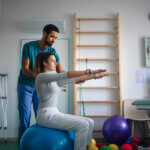A torn rotator cuff can have uncomfortable symptoms, including pain that makes moving your arm difficult. This discomfort is because the rotator cuff muscles help stabilize the shoulder. When those muscles are injured, the movement of the arm and shoulder can be inhibited. If you’re experiencing symptoms from a torn rotator cuff, you’re not alone. Around 2 million people annually will see a doctor because of a condition affecting their rotator cuff.
Are you experiencing symptoms from a torn rotator cuff? If so, physical therapy is a natural and effective treatment option for mending your torn rotator cuff.
What are some common symptoms of a torn rotator cuff?
A tear in the rotator cuff muscles is an acute injury caused by overuse or straining your shoulder too much. Here are some common symptoms that may indicate you have a torn rotator cuff:
- There’s pain in the shoulder when reaching above your head.
- You have trouble reaching behind your back.
- Certain motions of the arm or shoulder cause pain.
- Your shoulder is less flexible than before.
- You have difficulty sleeping on the injured shoulder.
- Your shoulder feels weaker than before.
If you experience some or all of these symptoms, then you may have a torn rotator cuff.
Suffering from a torn rotator cuff? Peak Performance Sports and Physical Therapy is ready to help
If you think you’ve torn your rotator cuff, you shouldn’t ignore your pain. Physical therapy can reduce the recovery time of a torn rotator cuff and may even help reduce your uncomfortable symptoms. Our specialists at Peak Performance are experts in treating shoulder pain. We are prepared to design a personalized treatment plan that addresses your rotator cuff symptoms.
Contact us today for more information about physical therapy for shoulder injuries or to schedule an initial appointment.







